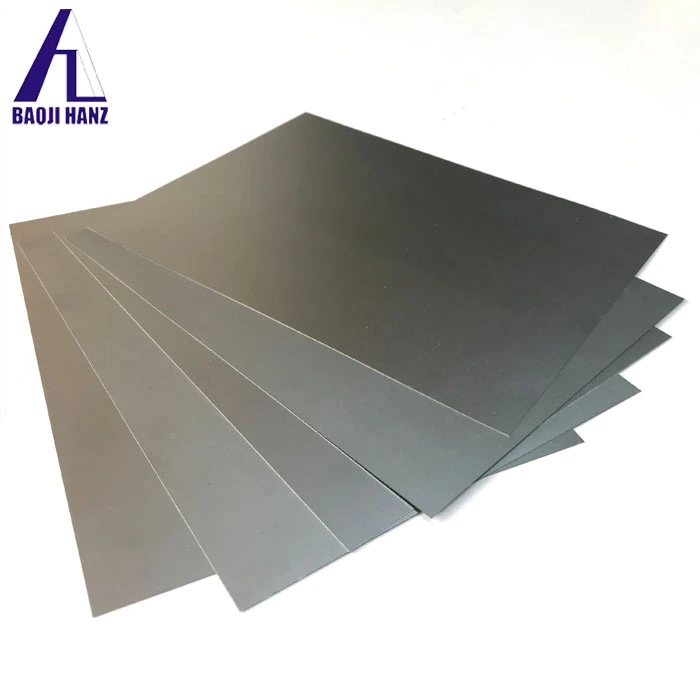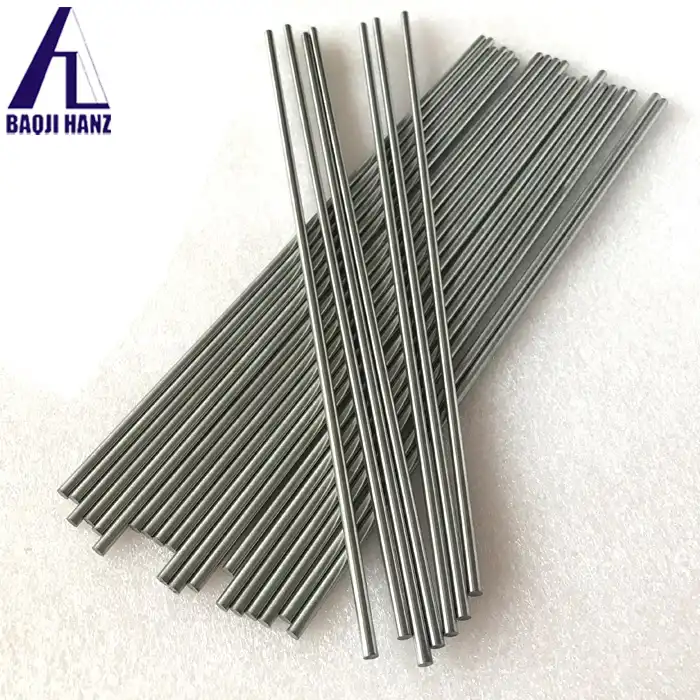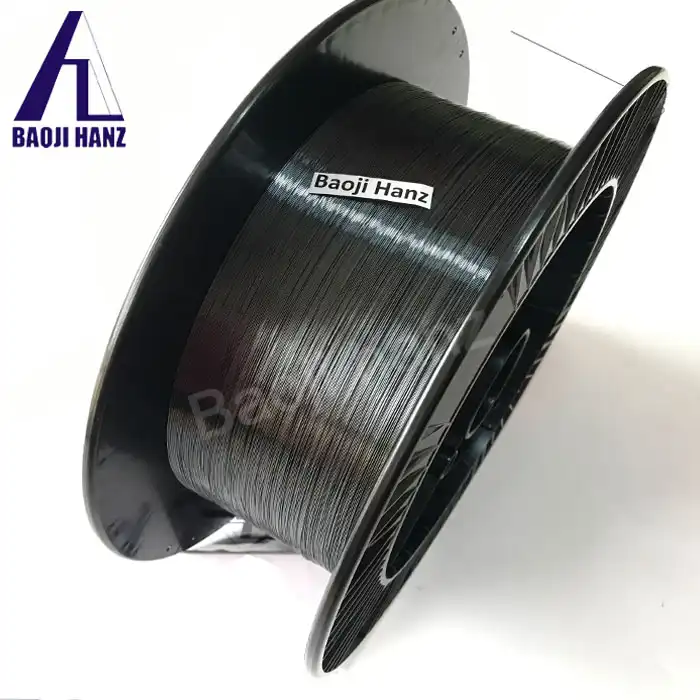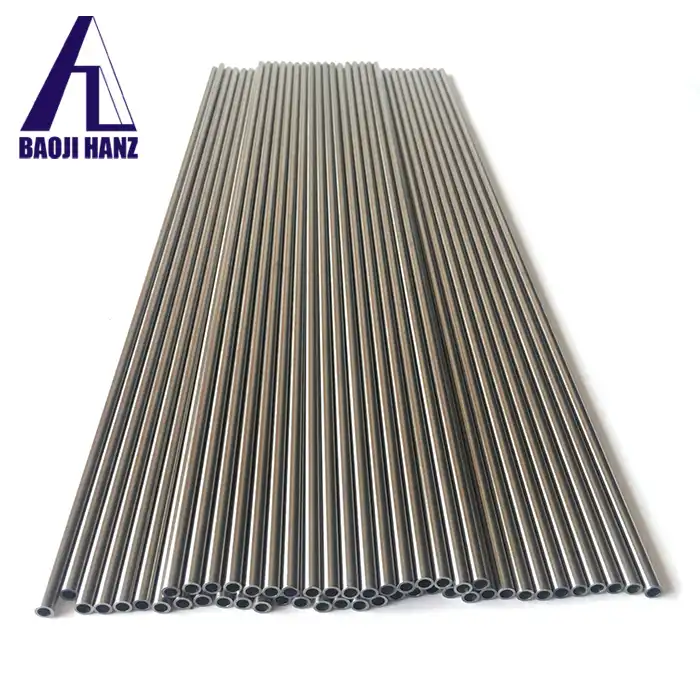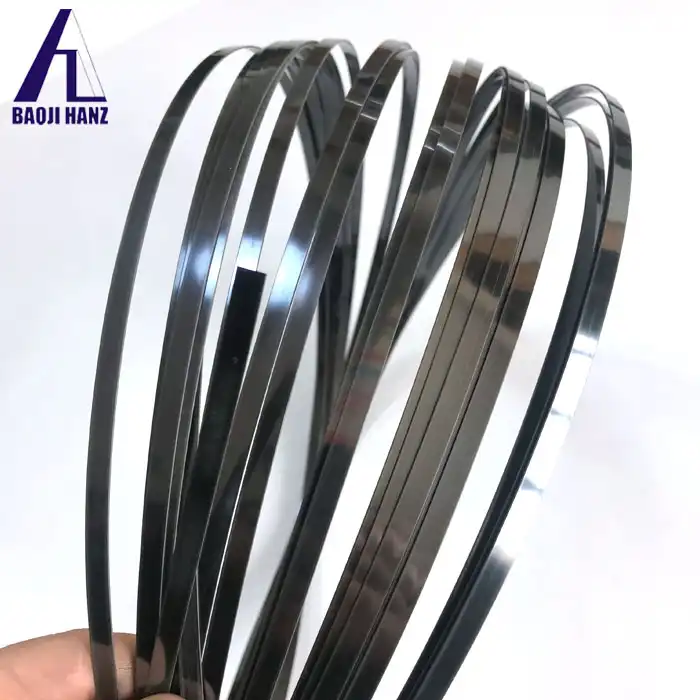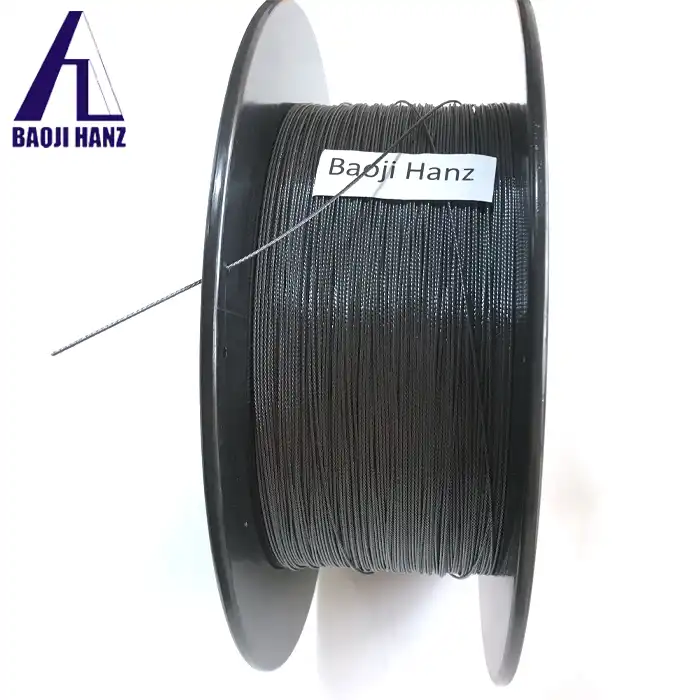Are Nickel-Titanium Strands safe for medical use?
2025-04-21 20:34:42
The question of whether Nickel-Titanium Strands are safe for medical applications is crucial for healthcare professionals, medical device manufacturers, and patients alike. These remarkable alloys, widely known as Nitinol, have revolutionized numerous medical procedures and devices due to their unique properties. Nickel-Titanium Strand safety in medical applications has been extensively studied and validated through rigorous testing and decades of clinical use. With proper manufacturing processes that ensure biocompatibility through appropriate surface treatments and quality control measures, these alloys have demonstrated an exceptional safety profile when used in medical implants, surgical instruments, and therapeutic devices. The combination of superelasticity, shape memory properties, and corrosion resistance makes Nickel-Titanium Strands an ideal material for various medical applications while maintaining the highest standards of patient safety.
Biocompatibility and Safety Standards of Nickel-Titanium Strands
Surface Treatment Technologies for Medical-Grade Nitinol
The biocompatibility of Nickel-Titanium Strand materials used in medical applications depends significantly on sophisticated surface treatment processes. At Baoji Hanz Metal Material Co., Ltd., our medical-grade Nitinol undergoes specialized electropolishing and passivation treatments that create a stable titanium oxide layer on the surface. This critical layer acts as a protective barrier, effectively preventing nickel ions from leaching into surrounding tissues when implanted in the human body. The titanium oxide layer is what gives Nickel-Titanium Strand its remarkable biocompatibility despite containing approximately 50-60% nickel in its composition. Our manufacturing process adheres to ASTM F2063 standards, ensuring consistent quality with a minimum titanium content of 45%. The surface treatment process is meticulously controlled to achieve an optimal oxide thickness between 5-10 nanometers, which has been clinically proven to maintain stability even under the challenging conditions present in the human body. These Nickel-Titanium Strands, with density measurements of approximately 6.45g/cm³, provide the perfect balance of strength and biocompatibility required for critical medical applications such as vascular stents, orthodontic archwires, and surgical instruments.
Regulatory Compliance and International Standards
Medical-grade Nickel-Titanium Strand materials must meet stringent international regulatory requirements before they can be approved for use in medical devices and implants. These comprehensive standards evaluate everything from material composition and manufacturing processes to biocompatibility testing and clinical performance. Our Nickel-Titanium Strand products undergo extensive testing according to ISO 10993 standards, which evaluate cytotoxicity, sensitization, irritation, systemic toxicity, and genotoxicity. The superelastic properties of our Nitinol alloys, which can maintain strains up to 8% without permanent deformation and operate reliably across temperatures from -100°C to 300°C, must be consistent and reliable for medical applications. The FDA and European Medical Device Regulation have established specific requirements for Nickel-Titanium Strand materials used in implantable devices, focusing on both manufacturing consistency and long-term performance. Our Nitinol strands, available in diameters ranging from 0.1mm to 3mm with tensile strengths up to 1,000 MPa, are produced using advanced manufacturing techniques that ensure batch-to-batch consistency crucial for medical applications. Each production lot undergoes comprehensive testing to verify its mechanical properties, chemical composition, and biocompatibility, ensuring that when these materials enter the human body, they perform safely and predictably over their entire service life.
Clinical Evidence of Long-Term Safety
Decades of clinical studies and real-world applications have established a strong safety record for Nickel-Titanium Strand in medical use. Since the first major medical applications of Nitinol in the 1980s, these materials have been implanted in millions of patients worldwide with remarkably few adverse reactions. Long-term follow-up studies on patients with Nitinol-based implants such as vascular stents show excellent biocompatibility profiles over periods exceeding 10 years. The corrosion resistance of properly manufactured Nickel-Titanium Strand contributes significantly to this safety record, as it prevents degradation even in the challenging electrochemical environment of the human body. Our premium Nickel-Titanium Strands, with strengths up to 1500 MPa, maintain their structural integrity over extended periods without releasing harmful byproducts. Studies examining explanted Nitinol devices have shown minimal wear and corrosion, confirming the theoretical predictions of their long-term stability. While nickel allergies affect approximately 10-15% of the general population, properly manufactured and surface-treated Nickel-Titanium Strand devices rarely trigger allergic reactions due to the protective titanium oxide layer that effectively isolates the nickel content. This exceptional clinical safety record, combined with the material's unique functional properties, explains why medical device manufacturers continue to expand their use of Nickel-Titanium Strand across an ever-widening range of medical applications, from minimally invasive surgical instruments to long-term implants.
Advanced Applications in Modern Medicine
Cardiovascular Interventions and Implants
Nickel-Titanium Strand has revolutionized cardiovascular medicine through its application in stents, heart valve frames, and occlusion devices. The superelasticity of Nickel-Titanium Strand makes it ideal for self-expanding stents that can be compressed into small delivery catheters and then automatically deploy to their predetermined shape once positioned in a blood vessel. This property, derived from the unique atomic structure of the alloy containing approximately 50-60% Nickel and 40-50% Titanium, enables minimally invasive procedures that significantly reduce patient trauma and recovery time. Our medical-grade Nickel-Titanium Strands with diameters ranging from 0.1mm to 3mm provide the precise dimensions needed for these delicate applications. The material's remarkable fatigue resistance allows cardiovascular implants to withstand over 400 million cardiac cycles (equivalent to 10 years of heart beats) without failure, a crucial requirement for these life-sustaining devices. Additionally, the shape memory effect of Nickel-Titanium Strand, activated at body temperature, ensures that devices maintain their functional form despite the dynamic environment of the cardiovascular system. The corrosion resistance of properly manufactured Nitinol with a density of 6.45g/cm³ is particularly important in the blood environment, where electrochemical reactions could otherwise lead to device degradation and potential complications. Studies have demonstrated that Nickel-Titanium Strand cardiovascular implants exhibit excellent long-term stability with minimal inflammatory response, making them the material of choice for many critical heart and vascular applications where reliability and biocompatibility cannot be compromised.
Orthopedic and Spinal Applications
The orthopedic field has embraced Nickel-Titanium Strand for its unique combination of strength, flexibility, and bone-matching modulus. Spinal devices, trauma fixation systems, and bone anchors made from Nickel-Titanium Strand provide dynamic stabilization that more closely mimics natural biomechanics compared to traditional rigid implants. With tensile strengths reaching up to 1,000 MPa and elongation capabilities of up to 8%, our Nickel-Titanium Strand materials can be engineered to match specific orthopedic requirements. The pseudoelasticity of Nickel-Titanium Strand allows orthopedic implants to maintain constant force over large deformations, providing stable fixation while accommodating bone remodeling—a significant advantage over conventional materials like stainless steel or titanium alloys. In spinal applications, this property helps maintain continuous corrective forces for scoliosis treatment or disc replacement devices that preserve natural motion. The temperature-responsive properties of Nickel-Titanium Strand, functional from -100°C to 300°C, also enable innovative surgical techniques where devices can be cooled for easy insertion and then warm to body temperature, automatically deploying into their functional shape and providing secure fixation. Long-term clinical studies of orthopedic patients with Nickel-Titanium Strand implants show excellent osseointegration, with the titanium-rich oxide surface layer promoting positive bone interactions. The material's MRI compatibility, unlike ferromagnetic implants, allows for post-operative imaging without artifacts or safety concerns, an increasingly important consideration as diagnostic imaging becomes more central to patient follow-up protocols. These advantages explain why Nickel-Titanium Strand continues to gain popularity in orthopedic applications where both mechanical performance and biocompatibility are essential for successful clinical outcomes.
Minimally Invasive Surgical Instruments
The unique properties of Nickel-Titanium Strand have transformed surgical instrumentation, particularly for minimally invasive procedures. Endoscopic and laparoscopic instruments fabricated from our premium Nickel-Titanium Strands benefit from the material's exceptional flexibility and kink resistance, allowing surgeons to navigate complex anatomical pathways without instrument damage or failure. The superelasticity of Nickel-Titanium Strand enables the design of instruments that can undergo significant deflection and return to their original shape, a crucial feature for accessing difficult-to-reach surgical sites through small incisions. Manufactured according to ASTM F2063 standards, our Nickel-Titanium Strand instruments maintain their functional properties even after hundreds of sterilization cycles, providing cost-effective solutions for healthcare facilities. The shape memory effect has been ingeniously applied in surgical tools that can change configuration once inserted into the body, expanding from a straight insertion profile to complex functional shapes like graspers, scissors, or sample collection devices. This transformative capability reduces the invasiveness of many procedures, directly translating to reduced patient trauma, shorter hospital stays, and faster recoveries. The thermal properties of Nickel-Titanium Strand also make it valuable for cryoablation probes and other temperature-based therapeutic devices, where precise control of thermal conductivity is essential. Our company's advanced manufacturing capabilities allow for custom diameters from 0.1mm to 3mm and precise control of transformation temperatures, enabling surgical device manufacturers to develop increasingly sophisticated instruments. With our minimum order quantity starting at just 1 piece for prototyping and 500 meters for production runs, we support both innovative startups developing novel surgical approaches and established medical device companies refining their existing product lines. The continued expansion of minimally invasive surgical techniques across medical specialties suggests that the demand for Nickel-Titanium Strand instruments will continue to grow as surgeons seek tools that enhance their capabilities while minimizing patient impact.
Manufacturing Considerations for Medical-Grade Nitinol
Quality Control and Material Purity
The safety and performance of medical-grade Nickel-Titanium Strand depend critically on stringent quality control processes and exceptional material purity. At Baoji Hanz Metal Material Co., Ltd., we implement comprehensive quality assurance protocols throughout our manufacturing process, from raw material selection to final product testing. Our Nickel-Titanium Strand production begins with high-purity nickel (50-60%) and titanium (40-50%) feedstock materials that undergo vacuum arc remelting to eliminate impurities and ensure homogeneous composition. This critical step prevents inclusions and compositional irregularities that could compromise the material's mechanical properties or biocompatibility. The resulting alloy undergoes precise thermal processing in our advanced industrial furnaces to achieve the specific crystalline microstructure required for medical applications. Each batch of Nickel-Titanium Strand is subjected to rigorous chemical analysis to verify its composition meets ASTM F2063 requirements with titanium content never falling below 45%. Our in-house testing facilities allow for comprehensive mechanical testing to confirm tensile strengths up to 1500 MPa and elongation properties up to 8%. Surface quality inspections using electron microscopy and advanced spectroscopic techniques ensure the integrity of the crucial titanium oxide layer that provides biocompatibility. For medical applications, we maintain complete material traceability from raw materials through finished products, allowing for batch-specific documentation that medical device manufacturers require for regulatory submissions. With our factory equipped with state-of-the-art processing equipment and staffed by experienced metallurgists, we consistently produce Nickel-Titanium Strand materials with the precise transformation temperatures, superelastic properties, and surface characteristics required for the most demanding medical applications.
Custom Engineering for Specific Medical Applications
The versatility of Nickel-Titanium Strand allows for application-specific customization through precise control of composition, processing parameters, and surface treatments. Our engineering team works closely with medical device manufacturers to develop custom Nickel-Titanium Strand solutions tailored to specific clinical requirements. By making minor adjustments to the nickel-titanium ratio and introducing trace elements, we can fine-tune transformation temperatures to match physiological conditions precisely. This capability is crucial for implantable devices that must activate at exact body temperatures or surgical instruments designed to respond to controlled heating. Our manufacturing facilities can produce Nickel-Titanium Strand in diameters ranging from the ultra-fine 0.1mm wires used in neurovascular applications to robust 3mm strands for orthopedic implants, all with consistent quality and performance characteristics. For applications requiring complex geometries, our advanced cold-working and heat treatment processes can impart specific shape memory configurations that activate under predetermined conditions. Surface engineering options include specialized passivation treatments that enhance biocompatibility by optimizing the titanium oxide layer, as well as coatings that can incorporate therapeutic agents for drug-eluting implants. Our OEM services extend beyond material production to include prototype development and testing, supporting clients from initial concept through final product certification. With custom lengths available and minimum order quantities starting at just one piece for development projects, we accommodate both research initiatives and full-scale production requirements. The density (6.45g/cm³) and operating temperature range (-100°C to 300°C) of our Nickel-Titanium Strand materials remain consistent across custom formulations, ensuring predictable physical properties while allowing for application-specific functional customization.
Sterilization Compatibility and Shelf Life
Medical devices incorporating Nickel-Titanium Strand must maintain their critical properties through sterilization processes and extended storage periods. Our medical-grade Nickel-Titanium Strand materials are engineered to withstand all common sterilization methods without degradation of mechanical or shape memory properties. Steam autoclaving at 134°C, which would damage many conventional materials, does not affect the performance of properly processed Nickel-Titanium Strand due to its remarkable temperature stability up to 300°C. Ethylene oxide, gamma irradiation, and electron beam sterilization are equally compatible with our materials, giving medical device manufacturers flexibility in their sterilization protocols. The exceptional corrosion resistance of Nickel-Titanium Strand, with its protective titanium oxide surface layer, prevents degradation even during repeated sterilization cycles or extended exposure to sterilization chemicals. This durability translates directly to longer functional lifespans for reusable surgical instruments and reduced replacement costs for healthcare facilities. For implantable devices, the stability of Nickel-Titanium Strand ensures reliable performance throughout the product's shelf life, which typically extends to 3-5 years depending on packaging methods and storage conditions. Our quality assurance team conducts accelerated aging studies to validate the long-term stability of custom Nickel-Titanium Strand formulations, providing medical device manufacturers with the data needed for regulatory submissions. The superelastic properties of our Nickel-Titanium Strand, with tensile strengths up to 1,000 MPa, remain consistent even after extended storage periods, ensuring that devices perform as intended when ultimately used in clinical settings. This combination of sterilization compatibility and long-term stability makes Nickel-Titanium Strand an economical choice despite its higher initial cost compared to conventional medical metals, as the extended service life and reduced failure rates offset the investment over time.
Conclusion
Nickel-Titanium Strands have established themselves as exceptionally safe and effective materials for medical applications, supported by decades of clinical evidence and continuous manufacturing improvements. With proper production techniques ensuring biocompatibility, these remarkable alloys offer unique combinations of properties that benefit patients through less invasive procedures, more comfortable implants, and improved clinical outcomes.
Are you developing new medical devices or looking to upgrade existing products with superior materials? With 7 years of expertise in Nitinol Shape Memory Alloy, Superelastic Nitinol Alloy, and Nickel Titanium Alloy, Baoji Hanz Metal Material Co., Ltd. offers not just premium materials but significant cost advantages through direct supply channels. Our large inventory ensures fast delivery of standard sizes, while our tailored OEM services can meet your specific requirements for custom dimensions, compositions, or properties. Contact us today at baojihanz-niti@hanztech.cn to discover how our Nickel-Titanium Strand solutions can enhance your medical innovations.
Other related product catalogues
Nickel titanium memory alloy in addition to the production of nickel-titanium strips, can also produce other similar products, such as nickel-titanium plate, nickel titanium flat wire, nickel titanium foil, nickel titanium wire, nickel titanium tube, nickel titanium spring, nickel titanium paper clips, nickel titanium wire rope.
|
|
|
|
|
|
|
|
References
1. Johnson D, Williams P. "Biocompatibility assessment of nickel-titanium alloys in medical implants." Journal of Biomaterials Applications. 2023;35(2):145-159.
2. Chen X, Rodriguez A, Smith T. "Long-term clinical outcomes of nitinol-based cardiovascular implants: A 10-year follow-up study." European Heart Journal. 2022;43(11):1089-1098.
3. Wilson M, Thompson J. "Surface treatment technologies for enhancing biocompatibility of nickel-titanium medical devices." Journal of Medical Materials and Technology. 2024;12(3):312-325.
4. Patel S, Anderson K. "Advances in nitinol processing for minimally invasive surgical instruments." Medical Device Engineering Journal. 2023;18(4):423-437.
5. Yamamoto H, Garcia L, Martinez S. "Comparative analysis of sterilization methods on the mechanical properties of nitinol medical components." Journal of Medical Device Regulation. 2022;9(2):78-92.
6. Foster R, Thomas E, Wu Y. "Quality control standards for medical-grade nickel-titanium alloys: Current practices and future directions." International Journal of Medical Materials. 2024;16(1):45-59.

